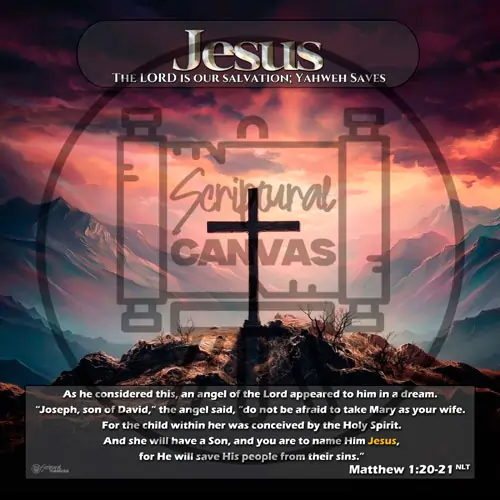Description
Jehovah Tsidkenu: A Name of Divine Righteousness
“Jehovah Tsidkenu” translates from Hebrew as “The Lord Our Righteousness.” This name, specifically used in Jeremiah 23:6, is a powerful declaration of God’s character and His provision for humanity. Understanding the components of this name is key. “Jehovah” (YHWH) is the sacred covenant name of God, indicating His eternal existence and faithfulness. “Tsidkenu,” derived from the Hebrew word “tsedek,” signifies righteousness, justice, and moral integrity. Thus, the name encapsulates the idea that God Himself is the source and standard of righteousness.
Righteousness as a Divine Attribute
The context of Jeremiah 23:5-6 is crucial. The prophet Jeremiah speaks of a future king, a “Branch of righteousness” from the line of David, who will reign with justice and equity. The verse states, “5 “Behold, the days are coming,” says the Lord, “That I will raise to David a Branch of righteousness; A King shall reign and prosper, and execute judgment and righteousness in the earth. 6 In His days Judah will be saved, and Israel will dwell safely; Now this is His name by which He will be called: THE LORD OUR RIGHTEOUSNESS.” This prophecy points to a figure who embodies God’s own righteousness, bringing salvation and security.
Righteousness, as expressed in “Tsidkenu,” is a fundamental attribute of God. It signifies His perfect moral standard, His impartial justice, and His commitment to upholding what is right. Throughout the Hebrew Bible, God is portrayed as the ultimate judge, whose judgments are always just. This divine righteousness is not merely an abstract concept but is actively demonstrated in God’s actions and dealings with humanity.
Jehovah Tsidkenu: A Visual Depiction of Divine Justice
This Scriptile presents a powerful visual interpretation of “Jehovah Tsidkenu”, ideally serving as a visual meditation on the themes of righteousness and salvation. The central figure, a blindfolded woman, immediately symbolizes the impartiality and objectivity of divine justice and its implications for humanity. The blindfold signifies that judgment is rendered without bias or prejudice, emphasizing God’s perfect fairness. This visual representation underscores the core message of the name: God’s righteousness is absolute and unwavering.
The choice to depict “Jehovah Tsidkenu” through these specific visual elements enhances the understanding of the name’s significance. The blindfolded figure and the scales visually embody the concepts of impartiality and justice, while the clouds suggest the divine origin of these qualities. The artwork effectively connects the theological meaning of the name to a powerful visual representation. It translates the abstract concepts of righteousness and salvation into a tangible image, making them more accessible and relatable.
The Branch of David, Justice and Judgement, Salvation and Security
The phrase “Branch of David” refers to a descendant of King David, indicating a royal lineage. This imagery is used in other prophetic passages, such as Isaiah 11:1 or Jeremiah 33:15, to describe a future king who would bring restoration and peace. The connection to David’s line emphasizes the continuity of God’s promises and His faithfulness to His covenant with David
Jeremiah 23:5 highlights the king’s role in “executing judgment and justice in the earth.” This signifies a reign characterized by fairness, equity, and the upholding of righteousness. It suggests a time when the world will experience true justice, free from oppression and corruption. This is a key aspect of the coming reign that the prophets foretold.
The promise that “Judah will be saved, and Israel will dwell safely” underscores the benefits of righteous rule. Righteousness leads to salvation, a state of deliverance from harm or danger, and security, a condition of peace and stability. These blessings are directly linked to the reign of the one called “Jehovah Tsidkenu.”
The concept of “Jehovah Tsidkenu” also raises questions about how human beings can attain righteousness. Some interpretations explore the idea that righteousness is both “imputed” (credited to someone) and “imparted” (lived out). This means that God not only declares people righteous but also empowers them to live righteously.
The Significance of the Name
The name “Jehovah Tsidkenu” is not merely a title but a profound declaration of God’s character and His redemptive plan. It signifies that God Himself is the source of righteousness and that He provides a way for humanity to experience His justice and salvation. This name emphasizes the connection between God’s character and His actions, revealing His unwavering commitment to righteousness.
Understanding “Jehovah Tsidkenu” encourages reflection on the nature of righteousness and its importance in both divine and human contexts. It invites consideration of how justice and equity should be reflected in individual lives and in society as a whole. This name serves as a reminder of God’s ultimate standard of righteousness and His promise of a future reign characterized by justice and peace.







Reviews
There are no reviews yet.